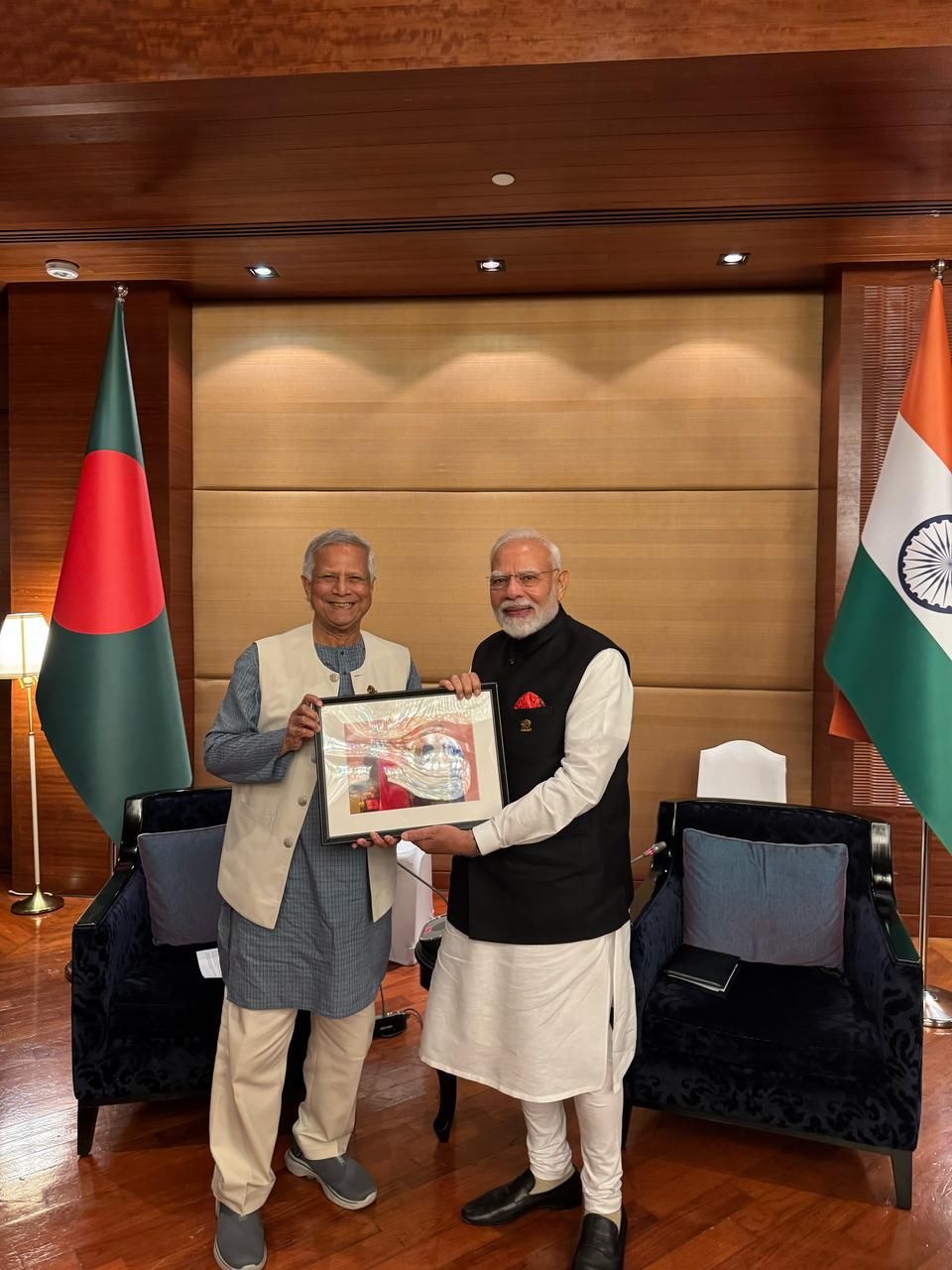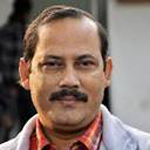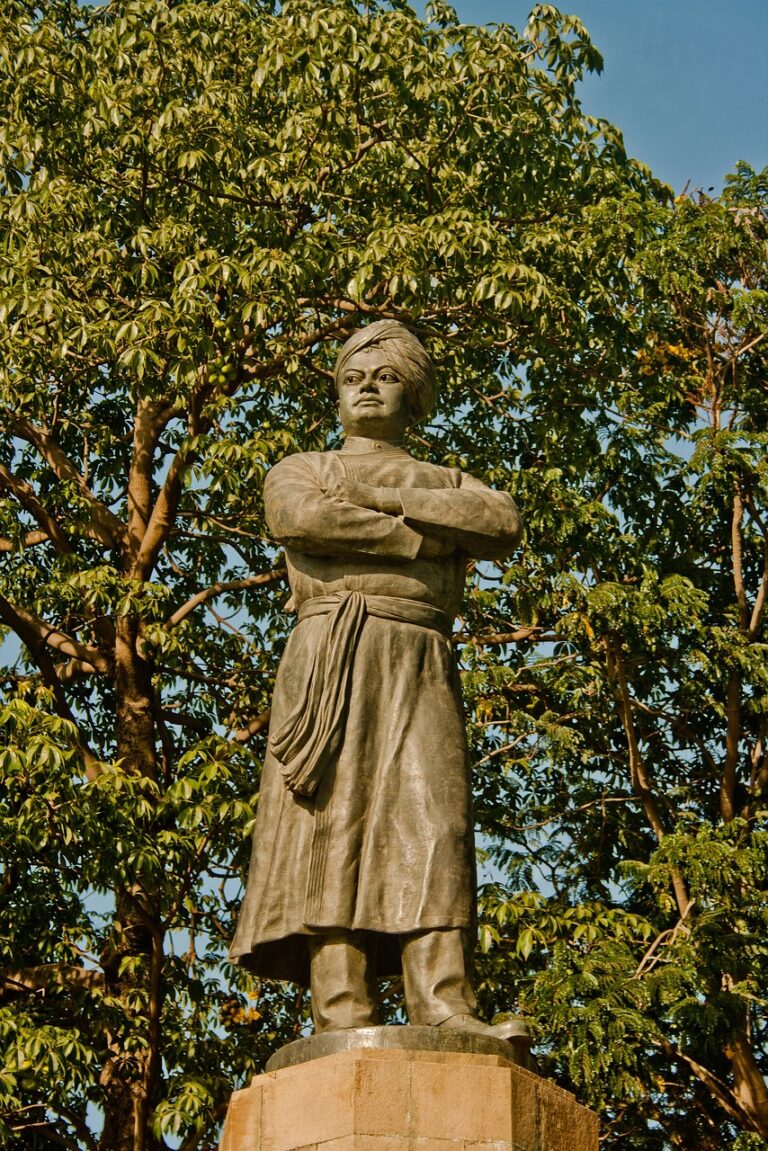
Chief Adviser Professor Muhammed Yunus presents a photograph to Prime Minister Narendra Modi during their bilateral meeting in Bangkok on Friday, April 4, 2025. The photo is about Prime Minister Narendra Modi presenting a gold medal to Professor Yunus at the 102nd Indian Science Congress that took place in Mumbai on January 3, 2015.
After the meeting between Indian Prime Minister Narendra Modi and Bangladesh’s interim leader Professor Muhammed Yunus on the sidelines of the BIMSTEC Summit in Bangkok on April 4, 2025, controversy arose following the Bangladesh version of the meeting, where it was reported that Modi admitted that deposed premier Hasina maintained ‘disrespectful behaviour’ towards Yunus.
On April 5, Yunus’s press secretary, Shafiqul Alam, posted on Facebook: “During the bilateral meeting, Indian Prime Minister Narendra Modi was very respectful towards Professor Muhammad Yunus. He spoke highly of his work. One of the things he said in the meeting was while India had good relations with Sheikh Hasina, ‘We saw her disrespectful behaviour towards you. But we continued to respect and honour you.’ And when Professor Yunus raised the extradition of Sheikh Hasina, the response was not negative. We are confident Hasina will one day be extradited to Dhaka and we will watch the trial of the century!! Also it was quite clear, India wants to chart a new course in its relationships with Bangladesh. The Indian Prime Minister told Professor Yunus several times during the meeting that India’s relations is with the people of Bangladesh, not with any single party or individuals!!! As Professor Yunus has said several times in recent months, we want ‘the best of relationships’ with India. But it has to be based on fairness, equity and mutual respects!!”
In another post on the same day, Alam stated: “We are confident Hasina will one day be extradited to Dhaka and we will watch the trial of the century!!” Today again, he posted a news report on Facebook that said the Awami League camp was deeply disappointed after the Yunus-Modi meeting. Loosely translated from Bangla, the mzamin.com report stated, “…They [India] thought that the diplomatic letter sent by Bangladesh seeking deposed prime minister and Awami League supremo Sheikh Hasina’s extradition was enough. Professor Yunus would not directly ask for her extradition while sitting in front of Narendra Modi. But in reality, that is what happened.”
Besides, another post on the official Facebook page of Yunus stated, that the Caretaker of Bangladesh enquired about the status of Bangladesh’s request for the extradition of Sheikh Hasina, the former Prime Minister of Bangladesh, which remains pending with the Indian government. He noted that the former Prime Minister had been making inflammatory remarks in various media outlets and attempting to destabilise the situation in Bangladesh, which seemed to be an abuse of the hospitality India has extended to her.
“She has consistently made false and inflammatory accusations against the interim government of Bangladesh,” Professor Yunus stated, and added, “We request that the Government of India take appropriate measures to restrain her from continuing to make such incendiary statements while she remains in your country.”
Also read:
- Avoid rhetoric that could harm relations: Modi tells Yunus
- Can Professor Yunus ban the Awami League in Bangladesh?
Professor Yunus also referenced the Office of the United Nations High Commissioner for Human Rights (OHCHR)’s Fact-Finding Report, which “confirmed” serious human rights violations and abuses committed by security forces and armed Awami League activists between July 15 and August 5, 2024. He said the OHCHR report estimated that 1,400 protest-related deaths occurred, with approximately 13 per cent of the victims being children. He stated the report also found reasonable grounds to believe that crimes against humanity, such as murder, torture, and other inhumane acts, were committed during the protests. According to the Facebook post, the UN report “notes that the Prime Minister herself had ordered security forces to kill protesters and specifically instructed them to ‘arrest the ringleaders, kill them, and hide their bodies.”
“Indian Prime Minister blamed social media for the tensions around Sheikh Hasina’s remarks. He said India’s attachment is with a country, not with any individuals or political organisations,” the Facebook statement claimed, adding that Modi said India does not support any particular party in Bangladesh. “Our relationship is people-to-people,” the Indian Prime Minister was quoted, saying.
Professor Yunus also raised the issue of border killings and stressed that working together to reduce the number of fatalities would not only save many families from “great anguish” but would also help to build trust and confidence and to strengthen the relationship between India and Bangladesh.
Some Indian media outlets quoted anonymous official sources, terming Bangladesh claims as ‘mischievous and politically motivated’. However, neither was there any official confirmation from the Indian side, nor was there any official response from Dhaka in his regard.
Bangladesh had already made a formal request to India for Hasina’s extradition on December 23, 2024, and New Delhi is yet to respond to Dhaka’s request for this issue. However, Hasina’s actual status of asylum has not been declared by the Indian government as yet.
India’s alliance with Hasina’s Awami League fostered deep ties, but her ouster and India’s decision to shelter her have alienated Bangladesh’s interim government. Modi’s Bangkok plea for a “positive and constructive relationship based on pragmatism” (reported by India’s Foreign Secretary Vikram Misri on April 4, 2025) rings hollow as Dhaka accuses New Delhi of stonewalling extradition talks—a legal obligation under the 2013 treaty, it argues.
Yunus’s outreach to China and Pakistan has further inflamed tensions. His Beijing comments about India’s “landlocked” northeast relying on Bangladesh for oceanic access prompted India’s External Affairs Minister S. Jaishankar to call it “geopolitical posturing” (March 2025). The Chinese side stated about Yunus’ visit to Beijing, on March 28, 2025, that the Bangladeshi side was willing to take the 50th anniversary of the establishment of Bangladesh-China diplomatic relations as an opportunity to work with the Chinese side to push for greater development of the comprehensive strategic cooperative partnership between the two countries. “The two nations should deepen Belt and Road cooperation. Bangladesh welcomes more Chinese enterprises to invest in the country, which will help promote its economic transition,” the Chinese foreign ministry stated.
In Bangkok, Modi had met with Professor Yunus for the first time after the lone Nobel laureate of Bangladesh took charge of the caretaker government in Dhaka after Hasina was deposed. Modi highlighted the issue of atrocities against minority people, including the Hindus in Bangladesh and hoped that the Yunus administration would thoroughly investigate all those incidents. He also insisted on maintaining the border secured and reiterated India’s support for a democratic, progressive and comprehensive Bangladesh. The issue of border killings and sharing of water from the Teesta River also surfaced in the discussion that lasted for around 40 minutes.
Informed sources in Dhaka said the exchange of words between the two leaders was “candid, productive and constructive with mutual respect for each other”, where Professor Yunus commented that Bangladesh deeply values its relationship with India. He is understood to have told Modi that the deep-rooted friendship between the two countries was founded on intertwined histories, geographical proximity, and cultural affinity. Bangladesh, sources said, remains thankful for the unwavering support of the government and people of India during its most challenging time in 1971. They claimed that even though the meeting did not offer immediate solutions to any problem between the two nations, it initiated an ambience of confidence and renewed trust. Professor Yunus reiterated his interest in going for national elections in Bangladesh very soon. He expected that the political parties would agree to accept a minimal reform in various administrative, financial, electoral and judicial systems with assurance that the winning representatives in the Jatiya Sansad would continue pursuing the reform process. To date, several political parties, including the Bangladesh Nationalist Party, the National Citizen Party, have expressed their readiness to join the polls.
As Bangladesh assumes chairmanship of BIMSTEC, Professor Yunus also sought the support of India for a free trade agreement among the seven BIMSTEC member-nations, namely India, Bangladesh, Nepal, Bhutan, Sri Lanka, Thailand and Myanmar.
Before the meeting between the two leaders, many political observers thought that the proposed meeting was unlikely for many reasons, including a strong statement by the Rashtriya Swayamsevak Sangh (RSS) targeting the government in Dhaka for its failure to protect the minority communities at the hands of radical Islamists. The RSS’s Akhil Bharatiya Pratinidhi Sabha 2025 in Bangalore expressed serious concern over the unabated and planned violence, injustice and oppression faced by the Hindus there. Terming it a fit case of human rights violation, the ABPS observed that several incidents of attacks on Hindu religious places, desecration of deities, looting of properties, abduction and molestation of women were recorded. The annual meeting of RSS, an ideologue of Bharatiya Janata Party, also called upon the international community to take serious note of these inhumane acts and pressurize Dhaka to take concrete steps to halt violence against Hindus and other minorities.
*Senior journalist





